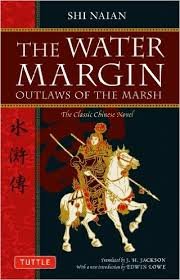Most Fridays in 2017 I hope to post a brief mention of the latest chapter(s) I’ve read in my 2017 classics read: The Water Margin (Outlaws of the Marsh) by Shi Naian, translation by J.H. Jackson and with an introduction by Edwin Lowe (Tuttle Publishing, 2010). I will use each chapter’s own synopsis as the synopsis.
Today: Foreword and Prologue
The brief Foreword, ostensibly by Shi Naian (but perhaps by the redactor, Jin Shengtan), introduces the author’s quiet life, briefly mentions some details of his household, and explains why he wrote the novel.
Why would anyone living such a quiet, isolated life need TEN messenger boys? I imagine them as local village boys who come and go, not all there at once, but always several convenient for running messages on command. And that’s besides the brooms and mats they make.
Prologue: Heavenly Teacher Zhang Prays for Cessation of a Pestilence; Marshal Hon Makes a Blunder in Releasing Demons.
Probably the main reason it’s taken me so long to dive into these Chinese classics (I only read Dream of the Red Chamber about 6 years ago) is the bizarre and unfounded belief I had that, being classics, they were inevitably turgid affairs as long-winded as your average Victorian novel, something one read to be well read rather than because they were enjoyable. Where did my preconceptions come from, I wonder?
In fact, The Water Margin is paced like a modern novel (I can’t judge how much that may be a factor of the translation, which was itself done in 1937 (and “rejuvenated” in 2009)). Your average 1990s fantasy novel is less fast-paced than this with its brief introduction to the later emperors of the Song dynasty and then the adventures of Marshal Hong, which are completely delightful. Marshal Hong does not strike me as sincere or adequate to the task. Besides being responsible for the release of the demons he conceals the foolish, arrogant deed from the Emperor.
As with Dream of the Red Chamber I can see I will learn a lot from this work about the effective use of cliff-hanging chapter endings. In fact, I have already almost finished Chapter One, and I’ll briefly discuss it in the January 13 post.
—–
Next Friday (Jan 13, 2017): Chapter One.
New to the readalong? Check out the introduction the Water Margin project.

